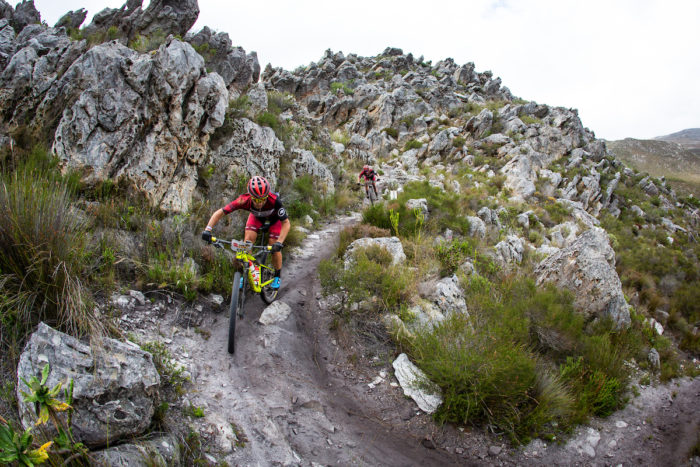The Cape Epic is coming, and I am going to be there. The world’s most televised mountain bike event. The untamed, the big one, the Tour de France of mountain biking. Call it what you will, I’ve seen the routes, seen the GoPro vision, seen the helicopters, and I am smart enough to know that even with dozens of stage races under my belt, I’m probably not ready for this.
But how ‘not ready’? In my day job I’m an academic, and academics love data. So I went and checked out how the Absa Cape Epic would measure up compared to the biggest or best-known mountain bike stage races in the world… is it as intimidating as I think it is? Let’s take a look at how the Cape Epic compares with BC Bike Race, Brasil Ride, Joberg2C, The Pioneer, Swiss Epic, and Transalp.
Stu Spies: Is the Cape Epic that hard?
But first a quick caveat: Of course, not all rival events are included here. This is just a sample of some events in the same family to give an impression of how hard the Cape Epic, relatively speaking, might be. Stats are from 2020 or 2019 depending on availability.
Duration
The Absa Cape Epic runs for 8 days. The average of the events in the chart above is just over 7 days, and it seems most long events, like the Joberg2C, max out at 9 days. Maybe that’s the longest anyone can get a leave pass from family or work commitments.
How does this look for me? I’ve done a couple of eight or nine day events in Transalp and the Croc Trophy, and I’ve done a number of six day events. I know what eight days, or even nine days feels like, and the first of the Cape Epic days is a shorter prologue stage.
The longer a stage race like the Cape Epic goes on, however, the bigger the risk of a DNF. I learnt that the hard way last year when I crashed 30 kilometres from the finish line of the Swiss Epic and couldn’t finish, losing the leader’s jerseys we’d worn each day in the process. And this all brings me to my next point: rider numbers.
Riders on course
Whoa, settle down there Cape Epic! That looks crazy. In fact, having raced Transalp in 2013 and been BLOWN AWAY by what 1,000 riders looks like in a ‘neutral start’ (hint: a bit like the opening scene of Saving Private Ryan – on bicycles!) this is by far the most intimidating piece of data I’ve seen and the thing that will worry me the most until I cross the finish line with my partner. The Cape Epic takes on 1300 riders in 650 teams. In 2019, 92 per cent of them made it to the finish line. 52 riders did not. The historical average (taken since 2004) is 86 per cent. Let’s hope that the 2019 figures are the start of an upward trend that sees more and more hopefuls reach the finish line of the great untamed. And especially Briony and me.
Cape Epic distance
In 2020 the Absa Cape Epic will cover 650 kilometres, and while Joberg2C is clearly the longest race in our little comparison, the fact that it lasts a day longer is worth investigating. If we look at the breakdown of kilometres per day, we get some additional insights:
Here, the Cape Epic is level-pegging with The Pioneer and in very similar territory to Brasil Ride.
Climbing
The Cape Epic is second to Transalp in terms of sheer metres gained over these events, proving that you don’t have to cross the alps to get a really sore back.
When it comes down to the steepness of the race itself (measured in metres climbed per kilometre averaged across the entire race), the shorter races based in mountainous areas come to the fore:
Bigness
Australians like me are always looking to capture what we call ‘the vibe’, and what Transalp organisers have famously called ’emotional experience’. Where the Cape Epic is concerned, this measurement will be most influenced by sheer scale, or how overwhelmed you’re likely to feel. You get a feel for it when you compare an aerial picture of the Cape Epic camp:
With an image of The Pioneer camp, taken about 10,000 feet lower it would appear. Cute huh? It’s about the same size as the Cape Epic media camp.
The organisation sends me emails weekly. There are, I am told, gifts! Picnic lunches! There is something called a ‘Strip Stop’ and I have even heard that somebody washes my bike for me.
I can download a rider or supporter badge, or a Facebook cover photo. Then as an elite rider there’s an entire profile to fill out, headshots to send off, interviews, stats, and they want to know what I weigh. People will be watching this race like no other race I’ve ever done. People at home, on their couches, are actually interested in what is happening on mountain bikes when they are ridden by people in the Cape Epic.
Stu Spies: The Cape Epic IS that hard!
In an effort to measure the ‘bigness’ of the Cape Epic I turned to Google and searched for each of our sample races to see what the interest in the event looked like. Here’s the number of results that came up:
Hungry for more Cape Epic stats? https://www.cape-epic.com/news/1229/
I guess how achievable a race is depends on what you can handle and what you can’t. As an introvert who hates massive fields and racing bar to bar with 90kg men, I have a feeling this is going to be challenging, even with the provisions made for women’s racing! On the other hand, if you’re a 90kg guy who just hates steep climbs and can’t get 9 days off work, you’re should probably just put your feet up right now because it’s going to be a breeze!
I’ve done three of the races on the sample list. How do races compare in your experience? Are there any readers out there who have done them all? Let us know!

